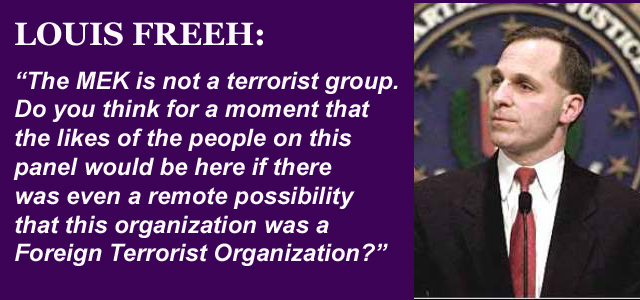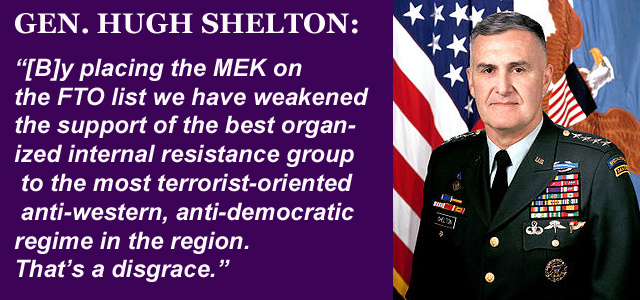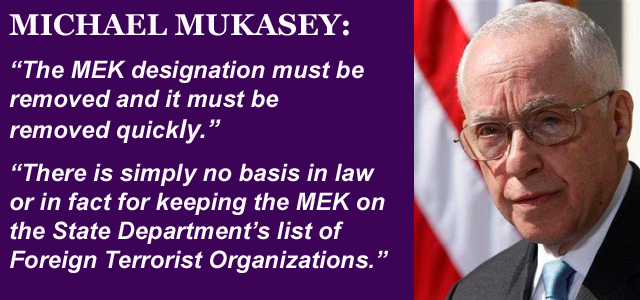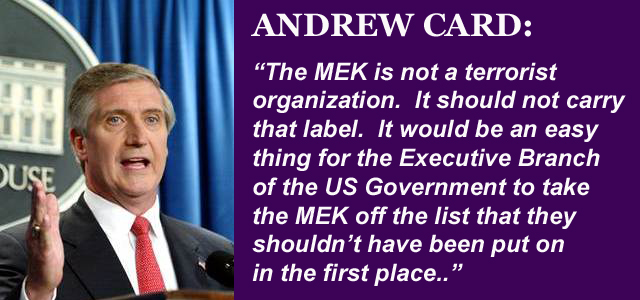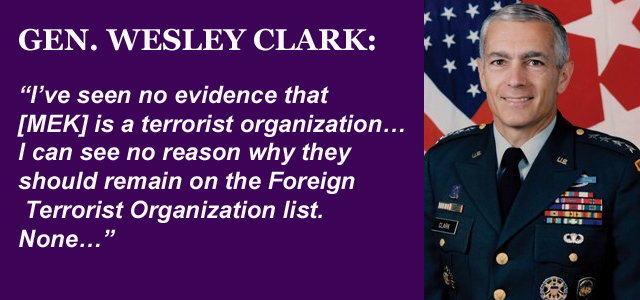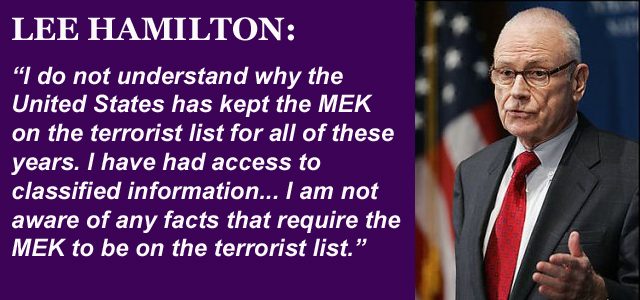Louis Freeh Calls for Delisting of MEK
MEK supporters call for de-listing from FTO
In recent weeks, the Iranian American Community of Northern California has been hosting a number of symposiums in Washington shedding light on the need to remove the Iran’s principal opposition movement, the Mujahedin-e Khalq (PMOI/MEK).
These events which feature senior officials from a number of previous administrations, with various backgrounds, ideologies, and areas of expertise are calling on the Obama Administration to change its policy in regards to the MEK, and remove them from the FTO. In response, the National Iranian American Council has launched a full-fledged campaign opposing the de-listing of the MEK, complete with an entire section on their web site dedicated to the issue, and even “tweeting” about it non-stop. Is this really the biggest issue on the table for Iranian Americans? And if so whose side is NIAC on?
The arguments used and recycled by NIAC over and over again have almost nothing to do with the legal process which the State Department is currently engaged in. Instead they weave their own narrative, and devise their own criteria as to what qualifies enlistment of an organization, than proceed to explain how it applies to the MEK.
The first and most blatantly inane argument that NIAC continues to assert is that the MEK is not popular in Iran and do not represent the views of Iranians, and as such should not be removed from the terrorist list. Just to be clear, does NIAC believe that one of the criteria for being labeled a terrorist organization is unpopularity? If conversely a group shows itself to be popular does that somehow absolve them of the terrorist label? If so, does NIAC support the delisting of groups like Hamas, Hezbollah and Al Qaeda based on their perceived popularity in the occupied territories, Lebanon and Afghanistan respectively?
Jamal Abdi, NIAC’s so-called policy director is either very good at distorting an argument or very ignorant as to how the State Department review works in regards to the delisting of organizations. He begins by stating that de-listing them would “free the group to inject violence into Iran’s democratic opposition movement.” Making a de facto statement that MEK is a violent organization, though the evidentiary record contains not one instance or act of terrorism in the last decade.
As an example of how the MEK is a violent organization Abdi cites a story in which MEK supporters in Iran chanted “Death to Khamenei” during the 2009 election uprising. This act, according to NIAC shows the groups propensity of incite violence, despite the reality on the streets of Tehran which saw protesters shot in cold blood and beaten by the regimes thugs. Never mind that these were ordinary citizens chanting what would end up being the most repeated slogan during the 2009 protests. Under this criterion I suppose Martin Luther King and Gandhi were also inciters of violence as their words were inevitably met with brutal repression. NIAC doesn’t bat an eye when attributing the brutal crackdown of the Islamic Republic as somehow being the fault of MEK, a classic smear tactic.
NIAC: Fighting for our rights?
In his attempt at presenting arguments as to why the United States should disregard its normal procedures in reviewing the evidentiary basis for the de-listing of the MEK, Trita Parsi the so called president of NIAC offers the following: “The State Department’s review of their terrorism status, which is due to be completed by August of this year, must be conducted without the essentially illegal pressure tactics the MEK currently is employing through lobbyists, lawmakers and hired former officials.”
So to be clear, Iranian Americans cannot advocate for their own due process and first amendment rights under the constitution, but Parsi and his pals can begin a full-fledged campaign to lobby for the MEK to remain on the list without the slightest hint of irony or hypocrisy?
Parsi seems to forget that the due process rights of this group were violated according to the US Court of Appeals for the District of Columbia, which “ordered the State Department to review its designation of the People’s Mujahedin Organization of Iran as a foreign terrorist organization, strongly suggesting the designation should be revoked.” If the organization’s supporters engage in a campaign to bring attention to the denial of its rights, as is legal under the First Amendment, this amounts to lobbying in Parsi’s eyes. However, NIAC dedicating half its web site, 90% of its tweets and what appears to be the majority of its resources to stone walling this review isn’t lobbying? What is NIAC’s excuse and stake in the controversy?
Lastly, Parsi contends: “Third, de-listing will put the rising Iranian-American community in a state of shock. In the last decade, an impressive civic awakening has occurred in this successful but previously politically silent community, with dozens of new groups being formed with the aim of contributing to the American democracy and providing the Iranian Americans in the U.S. with a voice. A U.S. funded and supported MEK will ensure a return to the pre-1997 era.”
As an Iranian American who has continually advocated on behalf of his community, the Iranian American Community of Northern California, nothing could be more insulting and offensive. Parsi’s absurd argument would have you believe that somehow Iranians will have their minds wiped and devolve into incompetent and apolitical buffoons if the MEK were de-listed. Yet in the same story, he maintains that the organization is loathed by all Iranians, and their delisting would incite anger and protest. Which is it?
A series of questions come to mind when reading the materials NIAC has put out regarding the proper criteria for deciding whether to delist the MEK.
1. Would the State Department remove the PMOI if they were in fact a violent organization?
2. Should one of the criteria for enlistment or removal be popularity?
3. Should the enlistment of terrorist organizations be a political decision, based on cost benefit analysis, or strict statutory guidelines and procedural due process that is guaranteed by the Constitution?
4. If the United States does remove the PMOI, and they do in fact begin a campaign of terrorism in Iran, wouldn’t the State department just as easily re-designate them as a terrorist organization?
5. Why is NIAC launching a full-fledged campaign in regards to this issue, yet dedicates so little energy or focus on the horrendous human rights situation in Iran.
Unclean Hands
Parsi and his group have a checkered past. In 1997, he created Iranians for International Cooperation, which according to its official website, had the objective of campaigning for “the removal of U.S. economic and political sanctions against Iran, and the commencement of an Iran-U.S. dialogue.” Before that Parsi had begun his career working at Congressmen Bob Ney’s office, another outstanding example of integrity who is now in prison for corruption. In Ney’s office Parsi even allegedly acted as courier for Tehran, receiving proposals from the regime to be relayed to Congress.
Last year, dozens of documents including internal NIAC e-mails, were released, as part of the discovery process during a defamation lawsuit. The evidence showed that Trita Parsi, arranged meetings between Iranian regime officials and members of Congress, including Tehran’s ambassador to the United Nations at the time, Javad Zarif.
All one has to do is to read any of the numerous published statements by Parsi to see the line NIAC is trying to push. Regardless of the current situation, he will conclude his elaborate analysis with the two points; that we need to continue to engage Iran, and that sanctions should not be imposed on the regime. What he doesn’t mention is how NIAC and its associates stand to benefit financially from lifting sanctions against the mullahs. The evidence released also indicates policy coordination between Parsi and a Tehran-based company with ties to the Iranian regime.
NIAC has largely ignored the human rights situation in Iran, only after the brutal summer of 2009 was it forced to make a few half hearted statements condemning the violence. In January 2008, during a meeting on Capitol Hill, Parsi publicly denied that NIAC had a human rights role. He said, “NIAC is not a human rights organization. That is not our expertise.” He added elsewhere, “The current choice Iranians face is not between Islamic tyranny and democratic freedom. It is between chaos and stability.” For NIAC stability is a pseudonym for the Iranian regime and chaos a pseudonym for democracy. Just as protesters who chant down with Khamenei are instigators of violence.
A number of other news outlets and reporters have covered this issue. The Spectator, caled NIAC the “de facto lobby” for the Iranian regime in Washington: It opposes sanctions on Iran, soft-pedals any controversial events in Iran, and counsels ‘patience’ regarding Iran’s stance towards its nuclear program. In November 2009, Jeffrey Goldberg of the Atlantic said, “A couple of weeks ago, I retracted my assertion that Trita Parsi, the head of the National Iranian American Council, did “leg-work” for the Iranian regime. … But now I may have to retract my retraction.”
Since the 2009 uprisings in Iran, the group has tried to re-invent its image by trying to paint itself as an advocate of “human rights” and the so called “green movement.” Before that, according to Politico, the majority of NIAC’s internal “minutes include almost no mention of a human rights agenda inside Iran.” Instead the organization seemed adamant to create campaigns such as “send Hillary to Iran” even as the Iranian regime committed horrendous human rights abuses. Not only did the abysmal human rights situation not come up in NIAC’s agenda, it actually worked to silence opposition as much as possible. According to the Weekly Standard, in fact, “the emails suggest that [Parsi] worked to dissuade dissidents from speaking out.”
Learn the Constitution
Apparently the majority of the rights guaranteed in the Constitution have been lost on NIAC and Trita Parsi, though to his credit it may be because he never had a high school civics course in the United States due to the fact that though he is the so-called “President” of the National Iranian American Council, he is a resident alien in the United States and in fact a citizen of Sweden.
Let’s imagine hypothetically that NIAC was a group which sought to defend the rights of Iranian-Americans. A simple glance at its web site and positions seems to allude to the fact that one of its main objectives is to protect the civil rights of Iranian’s residing in America in the post 9/11 era. One would imagine that the ruling of the US Court of Appeals for the District of Columbia that the due process of an Iranian opposition group was violated when they were enlisted as a terrorist organization would be of some significance to their desire to protect the rights and liberties of Iranians.
As a supposed representative body for Iranian Americans, perhaps NIAC might consider the First Amendment rights of free association for Iranian Americans who may want to support the MEK, regardless of their greater popularity. Does NIAC seek to uphold due process and constitutional rights only for those who it agrees with? Or is standing up for the constitutional rights of Iranians not part of the agenda? NIAC might also take it into consideration that the designation of the MEK is a major obstacle to the re-location of 3,400 refugees in Camp Ashraf, Iraq, never mind the fact that this designation is used as the basis to execute and imprison dozens of MEK sympathizers in Iran.
Perhaps Parsi was referring to NIAC when he talked about the delisting of the MEK as a major setback. If so then that is just one more issue in which they share common grounds with the regime in Tehran.
Trita Parsi and NIAC’s Handy Iran Experts Again
In recent days a statement supposedly written by a group of 37 experts on Iran (from 6 countries including Iran, Scotland, England, Canada and US) has surfaced on the cyberspace. The statement itself is a repeat of many recent articles and declarations by NIAC and its president Trita Parsi, who have embarked on a hysteric campaign against the People’s Mojahedin of Iran (PMOI or MEK). In the statement, the “experts” advocate for continued black listing of the MEK by the State Department.
These “experts” argue that delisting Mujahedin creates competition for the softer opposition to the Iranian regime, and hence weakens it. To understand the real motives and the modus operandi of the group signing the statement, let’s look at some background facts.
This is not NIAC’s first “joint statement by the experts”. Many of the same individuals who signed this letter issued another “expert statement” calling for an American rapprochement policy towards Iran and its current rulers (namely Khamenei and Ahmadinejad.) In that statement, the “experts” pressed for a policy of appeasement with the ruling Ahmadinejad, as opposed to supporting the green movement and a policy that would lead to regime change in Iran. In an effort to have the maximum influence on Congress, NIAC announced that:
“The National Iranian American Council (NIAC) is hosting an event in the U.S. Senate tomorrow (Nov. 18th). The event is designed to give President-Elect Obama advice on how to deal with Iran. In the process of preparing for the meeting tomorrow a group of 21 Iran experts have issued a report titled “Joint Experts’ Statement on Iran”,
At the end of that statement the following sentence was noticeable:
“This statement is the product of a large group of experts with diverse knowledge, experience and affiliations. “
The embarrassing fiasco with that NIAC’s “joint statement of experts” was that the “experts” failed to reveal to Congress and the public that the statement presented as the fruit of wisdom and the work of twenty one experts had already been published one year earlier under the sole authorship of Trita Parsi!
But why would a group of “experts”, tenaciously push for the continued listing of MEK? A listing that was used as the major justification by the Iranian regime and their proxies in their massacre of unarmed civilians in Camp Ashraf. I do not know the answer to that. However, I can point to a few self evident facts:
1- A large number of the “experts” signing the petition have formal affiliations with NIAC, an organization that has conspicuous financial and political ties with the ruling regime in Iran and their economic mafia. Documents discovered in the process of recent legal challenges that NIAC brought against its critics are self evident.
2- Some of the letter signer experts are involved in ventures that clearly benefit from the status quo in Tehran.. One example is Gary Sick, the Executive Director of Gulf2000, who serves the oil industry. Sick is also on the board of AIC (American Iran Council), an organization w which recived funds from the Iranian regime (through their NY Alavi Foundation).
3- Several have been working with the Iranian government to illegally funnel the US congressional funds to the Iranian agencies that Tehran wished to empower. Examples are Hadi Ghaemi and Dokhi Fasihian. Court documents affirm these individuals’ communications and collaborations with the Iranian officials and agents in the US.
4- Trita parsi is commonly known to be a strong advocate for Tehran who does their bidding in the United States. His $90,000 invoice for facilitating secrete negotiations for Mulahs, and his communications with, and reports to the Iranian envoy Javad Zarif has now surfaced in the court documents.
5- The anti green movement positions and propagandas by many of the “expert” signers of the letter cannot go unnoticed. In fact, the main point of their previous “joint statement by the experts” was to convince the American administration to give up hope on the green movement and instead get close to, and empower the existing rulers in Iran as the only possible option. In his article called “The End of the Beginning” , making a mockery of the mass demonstrations in the streets of Tehran , commonly regarded as the “beginning of the end” of the ayatollahs’ rule, Trita Paris wrote: “Iran’s popular uprising, which began after the June 12 election, may be heading for a premature ending. In many ways, the Ahmadinejad government has succeeded in transforming what was a mass movement into dispersed pockets of unrest. “
Finally, it should be pointed that the absence of any credible member of thegreen movement, or credible Iran experts who advocate the policy of appeasement , among the signatures of the statement indicated the bankruptcy of NIAC and their strive to pave the road for another massacre in Camp Ashraf.
Michael Mukasey Calls for Delisting of MEK
Trita Parsi: Remove Revolutionary Guards fromTerror List
In recent weeks NIAC (National Iranian American Council) and its president Trita Parsi have embarked on an intense, concentrated, and forceful campaign in Washington, and on the cyber space, against People´s Mojahedin Organization of Iran (PMOI – MEK). This campaign includes tens of Op-eds and articles, dedicated web pages, petitions, letters to legislators, seminars and webinars, and thousands of tweets in a matter of 4 weeks. To understand why NIAC, an organization that was founded based on the claim that it is “a non-profit, non-partisan, non-political and non-sectarian organization”, has so hysterically rushed to take a partisan, political, sectarian, and perhaps for-profit side, let´s systematically, and very briefly, review some background information.
The focus of NIAC and Parsi´s recent campaign is to prevent removing PMOI from the State Department´s list of foreign terrorist organizations (FTO). The terrorist listing was the prime justification [1] for two separate assaults by the Iraqi army in July 2009 and April 2011, on Camp Ashraf, residence of the nearly 3,400 members of the PMOI in Iraq. These attacks left more than 50 unarmed residents killed, and hundreds injured.
The blacklisting of PMOI was initiated in 1997, followed by the European countries, to facilitate a policy of appeasement with the Iranian regime (Norman Kempster, “U.S. Designates 30 Groups as Terrorists,” Los Angeles Times, October 9, 1997) . After thorough examinations by courts, United Kingdom in 2008, the European Union in 2009, France in 2010 and 2011, Germany in 2010 and 2011, have dismissed these allegations and removed the group from their blacklists. In July 2010, the US Court of Appeals for the District of Colombia Circuit ordered that the State Department re-examine the decision to keep the PMOI in the FTO list. It is expected that the State Department announce their decision soon. An increasing bi-partisan group of more than 130 members of US Congress and high ranking officials from four US administrations, are unified in their opinion that there is no basis for continued listing of PMOI, and have called for their removal from the FTO list.
This campaign is not NIAC or Parsi´s first lobbying campaign to influence the FTO list of the State Department. In the summer of 2007, Trita Parsi embarked on another campaign to remove the Iranian Revolutionary Guard Corp (IRGC) from the State Department´s Terrorist list. The designation of the Guard´s Corp was in response to Iranian´s infiltration in Iraq, and in particular their direct role in killing [2] hundreds of American soldiers through improvised explosive devices (IED). Parsi argued [3] that “The White House’s decision to designate the Iranian Revolutionary Guards Corps as a terrorist organization could deal a double blow to efforts to utilize diplomacy with Iran to stabilize Iraq.” Note that the Iranian regime itself could not better fit the threat to “up the ante in Iraq”, and the pledge of “good behavior at the negotiation table” in one argument! Prior to this campaign, Trita Parsi was in close and intense communication with the Iranian regime. Evidence of these communications have recently surfaced in a court discovery. Needless to say that Parsi and NIAC´s campaign to remove the revolutionary guards, the murderers of the youth in the streets of Iran, remained futile.
Trita Parsi´s political career is solely defined (since his student days when he started working for the disgraced, pro-Iranian congressman Bob Ney) by advocating positions and actions that favor the Iranian regime´s interests.
If the Iranian government could wish for an ambassador at large in the United States to advocate their wishes, undoubtedly they would have wished for someone who would mimic Trita Parsi. Some examples of Trita´s advocacy are listed below.
– Working with Bob Ney to block the sanctions against the Ayatollahs [4],
– Facilitating Mahmood Ahmadinejad´s reception and speech in the Columbia University [5],
– Promoting the belief that the Iranian nuclear aspiration is strong and mature enough to a point that the United State and the world must learn to live with it, and share the region with the Ayatollahs. Parsi, in answering [6] “Is the United States ready to share the region with Iran?” suggests a “paradigm shift” in the US policy towards accepting Iran´s hegemony in the region, otherwise, it will “disable future administrations from turning political opportunities into real diplomatic breakthroughs — irrespective of their positive intentions.”
– Promoting the belief that the Iranian Green Movement is dead now, and West must fall back again on the appeasement policy and be kind to the current regime. In his article called “The End of the Beginning” [7] , making a mockery of the analysis that the mass demonstrations in the streets of Tehran were the “beginning of the end” of the theocratic regime, Paris wrote: “Iran’s popular uprising, which began after the June 12 election, may be heading for a premature ending. In many ways, the Ahmadinejad government has succeeded in transforming what was a mass movement into dispersed pockets of unrest. Whatever is now left of this mass movement is now leaderless, unorganized — and under the risk of being hijacked by groups outside…”
The pattern and history of Trita Parsi and NIAC, is the clearest explanation for their recent intense campaign against removing MEK from the US blacklist.
[1] http://iranntv.com/node/5587
[2] http://abcnews.go.com/Blotter/IraqCoverage/story?id=1692347&page=1
[3] http://niac.convio.net/site/News2?page=NewsArticle&id=5710&security=1&news_iv_ctrl=-1
[4] http://archive.frontpagemag.com/readArticle.aspx?ARTID=25959
[5] http://iraniansforum.com/index.php/gallery/trita-parsi-coordinated-his-lobby-with-iranian-regimes-associates/trita-parsi-coordinated01-147#joomimg
[6] http://www.huffingtonpost.com/trita-parsi/can-the-us-and-iran-share_b_97670.html
[7] http://www.foreignpolicy.com/articles/2009/06/26/the_end_of_the_beginning
Secretary Clinton, Delist MEK
Lives of 3400 Iranian dissidents in Iraq are threatened; Secretary Clinton should listen to the voice of distinguished and well-respected top American officials
OfficialWire
12 August 2011
WASHINGTON, D.C. (USA) – A group of distinguished and well respected top American officials have spoken in support of delisting the Iranian opposition, Mujahedin-e Khalq (MEK /PMOI), from the State Department FTO list. The campaign to counter the Iranian regime’s disinformation campaign to hamper the Iranian opposition seems to bother some lobby groups in Washington such as NIAC nowadays.
The efforts are aimed at securing the safety of 3400 unarmed individuals, including 1000 women, in Camp Ashraf in Iraq, who are faced with a potential massacre at the hands of Iraqi forces under Iranian influence and pressure, especially after the year-end when US forces are due to leave Iraq. Each of the residents was recognized as Protected Persons by the US after they signed an agreement with the US military in 2004 to voluntarily surrender their arms in exchange for safety. The US protected the camp until 2009 and handed over control to the Iraqi government under the SOFA agreement (US-Iraq Status of Forces Agreement).
The camp has been attacked twice by Iraqi forces acting on behest of the Iranian government and 36 residents including 6 women have been massacred during the latest attack this April. Delisting MEK will deny the Iraqi authorities the justification to conduct another attack on the unarmed and peaceful camp where Iranian dissidents live, under pretext of countering terrorism.
The Iranian regime’s Washington-based lobby is targeting former top US officials from the full political spectrum who have worked for the Clinton, Bush and Obama Administrations, for making paid speeches during their visits to various venues to attend conferences organized by Iranian Americans and Iranian exiles this year, which is a common practice among former US officials. The Iran lobby hopes to confuse the issue by targeting the officials for speaking fees. It is a perfectly legal practice for a former official to make a paid speech for a cause he believes in. Many former officials including former US presidents, including Presidents Clinton and Bush, accept fees for their speeches after leaving office.
If these lobbyists are so concerned about and want to stop this practice, they should in fact address the way American politics is run. It seems the pervasive message by these officials in support of the MEK has delivered a hard blow to the storyline promoted by the Iranian regime to cast the MEK as a terrorist organization despite the lack of any evidence to support the allegations. The UK removed the MEK from the list in 2008 and the EU in 2009 after courts found no evidence of terrorist action. It won no less than 22 battles in courts across Europe as it sought to be delisted there. The US Federal Court of Appeals, DC Circuit, ruled in June 2010 to remand the case to the Secretary of State after no evidence was found to support the designation by the court, strongly suggesting the Secretary should revoke the listing.
The designation was based on “classified” documents. These documents which lack any significant substance originate from the Iranian regime and propagate through its web-sites and the Iran lobby in Washington and ultimately end up in the State Department’s classified dossiers by low-level State Department employees of Iranian origin affiliated with NIAC who seem to have a serious conflict of interest. Reza Marashi, who today is Director of Research for NIAC, once served at the State Department’s Iran desk for 4 years until recently. Mr. Marashi has written several articles lambasting the MEK based on pure allegations and no proof. It is of serious concern that a group such as NIAC, known to have extensive links with Iranian officials, under investigation for misusing government funds in lobbying for Tehran, and accused of being an unregistered agent of the Iranian government would have so much influence in shaping US policy toward Iran and Iran’s main opposition force.
NIAC has launched a disinformation campaign in the US against the Iranian opposition MEK to bolster its ties with the Iranian regime. It has belittled the threat of the Iranian nuclear program, has lobbied against effective sanctions, and has encouraged US and Iran reconciliation in favor of Iran’s interests and contrary to the Iranian people and US national interests.
NIAC was formed in the US to seemingly advance Iranian-American civic participation. But in actuality it has worked to advance Iranian regime policy interests in Washington with slick campaigns. Hassan Daioleslam, an Iranian analyst familiar with NIAC’s activities, has linked NIAC to the Iranian regime with extensive research.
It seems the message that the Iran lobby wishes to convey is that US officials have spoken in support of delisting of MEK out of ignorance and only for the money, perhaps being bribed.
But a review of the list of former top US officials and their speeches makes this quite implausible. For example, Howard Dean who has made pro bono speeches as well in support of the MEK delisting, said, “We must change our position on the MEK and stop calling them a terrorist organization. They are not a terrorist organization, they have their own bill of rights, which is an extraordinary thing under the leadership of Maryam Rajavi, and we appreciate what she has done greatly,” in reference to a 10-point plan for future Iran that Rajavi, a leader of the NCRI has put forward.
The furor that the Iran lobby has been trying to whip up over the support of top US officials, is really a brazen attempt by Tehran’s lobby, and mainly NIAC, to intimidate public opinion and these well-respected foreign and security policy experts and to pressure them to back away from the views they have expressed.
What is shameful is the Iranian regime’s funding of these lobbies to oppose MEK. According to documents available on the Internet hundreds of thousands of dollars were paid out to lobbies such as NIAC to advocate Iranian regime’s propaganda in the US and publish articles in the media to that effect.
The main motivation behind the State Department’s listing was to curry favor with the mullahs. In September 2002, Assistant Secretary of State for Near Eastern Affairs during the Clinton Administration, Martin Indyk, told Newsweek, “[There] was White House interest in opening up a dialogue with the Iranian government. Top Administration officials saw cracking down on the [MEK], which the Iranians had made clear they saw as a menace, as one way to do so.”
This is what John Sano (former Deputy Director of CIA for National Clandestine Service) had to say on this issue in a recent conference in Washington with the Camp Ashraf massacre back in April as an instance: “The situation in Camp Ashraf and the recent massacre which occurred there only three months ago, is the perfect example in terms of what the MOIS is able to do in attempting to shape world opinion. It has been their consistent maligning of the MEK as a subversive and terrorist organization. This is in direct contravention of the reports here in the United States and internationally that have provided the true story behind the massacre… and the reality of the MEK as peace loving, pro-democratic, nonviolent, organization seeking only to promote a system with freedom of speech, assembly, and political parties, as separation of church and state and gender equality.”
Circulating cheap hearsay such as the Mujahedin-e Khalq’s participation in the American Embassy’s seizure and calling for the execution of American hostages is nothing but distorting the truth. Anyone familiar with events in Iran during the 1980s knows well that MEK never took part in the American embassy seizure. On the contrary, the Iranian regime used the opportunity to fasten its grip on power and isolate progressive groups and the opposition including the MEK.
The Iran lobbies have argued that delisting the MEK would give the Iranian hard-line rulers more reason to clamp down on Iran’s internal opposition and the green movement. One can question this kind of irrelevant rhetoric to keep an organization unjustly in the FTO terror list. Is this the statutory legal requirement to keep an organization on the FTO terror list? The time has long passed to exploit legal measures to advance certain political goals. After all, the State Department FTO list is not meant to promote the green movement in Iran and elsewhere, rather it is intended to confront the terrorist threat against US interests. MEK has never been a threat to the US at any time.
However, events of past 14 years, the period the MEK has been kept on the FTO list have demonstrated the moral and political drawbacks of the MEK listing on the opposition inside Iran. The Iranian people have suffered the most brutal crack-down during the past decade and the Iranian regime has used the terrorist label against MEK to silence all voices of opposition inside Iran. Only in the past two years, following post-election protests, thousands have been arrested and hundreds have been executed or tortured, mainly affiliated with the MEK.
The NIAC and their usual roster of so-called experts claim that delisting the MEK will hurt the opposition inside Iran. Delisting of MEK, as the most organized and effective opposition against the Iranian dictatorship could, however, limit the Iranian rulers’ ability to suppress the opposition inside Iran under pretext of terrorism. The ramification of January 2009 delisting of MEK in Europe contributed extensively to the spread of the protests in June of 2009 following the fraudulent presidential elections in Iran.
If NIAC’s argument were to be true, then the MEK and the victims of the regime’s crimes are the source of the problem and not the Iranian dictatorship. Likewise, one can claim the Jews were responsible for their own deaths during the Nazi period and they would never have been massacred if they had not existed or had been kept isolated in their ghettos. This is of course preposterous.
The time has come for the US Secretary of State, Hillary Clinton, to ignore the vicious calls originating from Tehran and listen to the voices of conscious coming from former US officials with distinguished records of public service, and the Iranian people, and make the right decision to remove the MEK from the FTO list.
Klick here to sign the petition urging Hillary Clinton to delist MEK
Joseph Omidvar is a scholar in Middle Eastern studies specializing in Iran policies.
http://news.officialwire.com/main.php?action=posted_news&rid=86543
